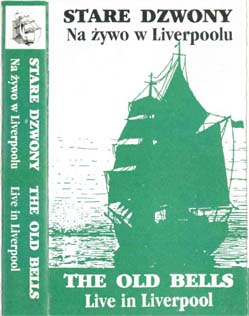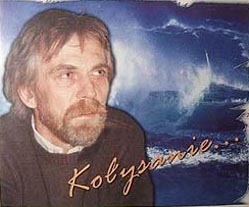Recorded
at
the Albert Dock:
Stare Dzwony
(The Old Bells):
Live In
Liverpool
During
the mid-1980s maritime music revival in America and Western
Europe, a new
and totally
unique sound
arrived on the scene from Poland that
amazed audiences.
It was
embodied by the group Stare Dzwony, the leaders of a sea shanty
movement in
Poland that translated tradition songs of the sea into Polish and sung
them
with harmonies never before heard by Western audiences. When Stare
Dzwony first
arrived in Liverpool in
1986, they had only
recorded in Poland, and
as my group the
Press Gang
shared the same stage, we soon became fast friends, inviting us to Poland the
following year.
When
they returned to Liverpool the next time, I couldn't miss the
opportunity to
drag them into a tiny, cramped recording studio at the Albert Dock to
make the
first, live, on-the-spot recording outside of their native land, which
included
a hauntingly beautiful translation of "Hail Queen of Heaven" crafted
at the request of Liverpool Spinner and festival producer Tony Davis
for a
performance at the Liverpool Cathedral.
In the years since, we have performed together many times, including
sadly at the 1995 Warsaw funeral of group member Janosc Sikorski, an
irretrievable loss. But here, at the height of their expansion, is the
original four, fueled by the excitement of singing at the Liverpool
birthplace of so many of the songs that they took and made their own.
-- John Townley
1. Royal
Oak
2. Mobile Bay
3.
A
Hundred Years Ago (Bob Webb,
guest vocalist)
4.
Sailor,
Sailor, Sail On
5.
Running
Down To Cuba (John Townley,
guest vocalist)
6.
Codfish
Shanty
7.
Shallow
Brown
8.
O
Shake Her
9.
Hail
Queen of Heaven
10. Eliza
Lee
11.
Roll, Alabama
(Bob
Webb, guest vocalist)
12.
Hiss
‘em Up
13. Lowlands
14.
Sally
Rackett
15. Essoquibo River
(John Townley, guest vocalist)
16.
John
Cherokee
17. Going Home Song
For
more on the current
incarnation of Stare Dzwony, go here...
More on the Polish
"shanty movement":
Sea shanties and the tall tales, maritime arts
and
crafts, and nautical history that go with them have a place unique in
Poland -- and mostly unknown in other countries -- with a
huge
popularity which has sustained itself in the youth culture since the
late 1970's. Back then, it began as a quiet protest
movement -- if they won't let us go to sea, well we can at least sing
about it. And sing they did, organizing dozens of shanty
groups
and festivals first among small boatniks at sailing clubs and later
spreading to the rest of the culture. Collecting and
translating
mostly English and American songs (Poland has only a few native sea
songs), young people began to gather in larger and larger groups, until
festivals like the oldest and biggest at Krakow (miles from the sea, in
the cold of February!) drew easily ten thousand to a concert.
By the late 1980's, groups from abroad
were invited
in and the movement took another big leap, swelling its international
roots. Meanwhile the originators had become parents and their
children were learning sea songs in school. It's hard to
think of
children being enthusiastic about their parents' favorite tunes, but
one school has a fifteen-year-old shanty program (only the best
students get to participate full-time) with a group of performing
12-13-year-olds that regularly tours the Baltic.
Whenever you are in Poland, there is a
chance to
take in some of this phenomenon. There are shanty festivals
all
year long, from the shores of the Baltic through the Mazury Lake
District, down to the Carpathians, with each new generation varying but
carrying on the tradition, whether it's a capella purists or maritime
rock and roll bands equally devoted to traditional and modern songs of
the sea.
|
|
|

Marek
Siurawski
Jerzy
Porębski

Original
cassette cover
click here for
original cover
insert A
click here for
original cover
insert B

Ryszard
Musaj

Janusz
Sikorski
|











